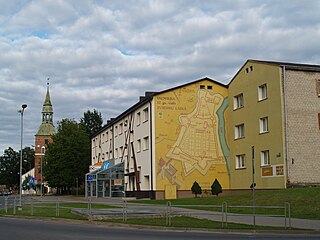
Ivan IV Vasilyevich, commonly known as Ivan the Terrible, was the Grand Prince of Moscow from 1533 to 1547 and the first Tsar of Russia from 1547 to 1584.

Khovanshchina is an opera in five acts by Modest Mussorgsky. The work was written between 1872 and 1880 in St. Petersburg, Russia. The composer wrote the libretto based on historical sources. The opera was unfinished and unperformed when the composer died in 1881.
The Khazar Correspondence was an exchange of letters in the 950s or 960s between Hasdai ibn Shaprut, foreign secretary to the Caliph of Cordoba, and Joseph Khagan of the Khazars. It is one of the few documents known to have been authored by a Khazar, and one of the very few primary sources on Khazar history. It gives both an account of the Khazar conversion to Judaism and of its progress in subsequent generations, as well as demonstrating that within a generation of the fall of the Khazar empire in 969, the Khazar state was still militarily powerful and received tribute from several polities.

Afanasy Afanasyevich Fet, later known as Shenshin ; 5 December [O.S. 23 November] 1820 – 3 December [O.S. 21 November] 1892), was a renowned Russian poet regarded as the finest master of lyric verse in Russian literature.

The Princes Shuysky (Шуйские) is a Rurikid Princely family of former boyars descending from Grand Duke Dmitry Konstantinovich of Vladimir-Suzdal and Prince Andrey Yaroslavich, brother to Alexander Nevsky. Their name is derived from the town of Shuya, of which they gained ownership in 1403. The family briefly reached the Russian throne in the person of Vasili IV (1606-1610).
Prince Alexander Borisovich Gorbatyi-Shuisky was probably the most celebrated and popular general of Ivan the Terrible. The town of Gorbatov in Nizhny Novgorod Oblast bears his name.

Vasily Osipovich Klyuchevsky was a leading Russian historian of the late imperial period.
Knyaz Andrey Mikhailovich Kurbsky was an intimate friend and then a leading political opponent of the Russian tsar Ivan the Terrible. His correspondence with the tsar is a unique source for the history of 16th-century Russia. In the Grand Duchy of Lithuania in the 16th century Prince Andrew Kurbsky dynasty Rurikovich was written in Polish in documents under the surname Krupski Coat of arms Levart.
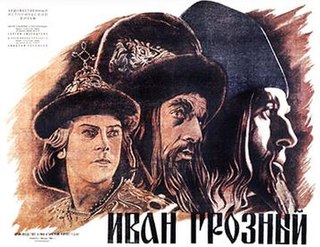
Ivan the Terrible is a two-part historical epic film about Ivan IV of Russia, written and directed by the filmmaker Sergei Eisenstein. It was commissioned by Soviet Premier Joseph Stalin, who admired and identified himself with Ivan.
Vorotynsky was one of the most eminent Rurikid princely houses of Muscovite Russia. Their lands lay principally in the Upper Oka region and comprised the towns of Peremyshl and Vorotynsk as well as parts (дольницы) of Novosil and Odoyev.

Boris Godunov is a closet play by Alexander Pushkin. It was written in 1825, published in 1831, but not approved for performance by the censor until 1866. Its subject is the Russian ruler Boris Godunov, who reigned as Tsar from 1598 to 1605. It consists of 25 scenes and is written predominantly in blank verse.

Ivan Ivanovich of the House of Rurik, was a Tsarevich of Russia. He was the son of Ivan the Terrible, who eventually killed him.
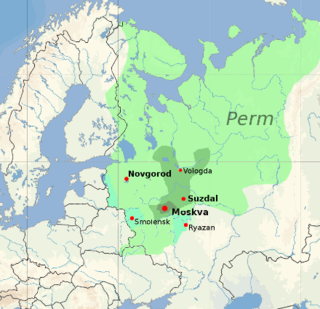
The Grand Duchy of Moscow, Muscovite Rus' or Grand Principality of Moscow was a Rus' principality of the Late Middle Ages centered around Moscow, and the predecessor state of the Tsardom of Russia in the early modern period.

The Novena to Saint Michael is a Roman Catholic Novena prayed to Saint Michael the Archangel. Like all other Novenas it is prayed on nine consecutive days with a specific intention.

Boris Godunov is a 1986 drama film directed by and starring Sergei Bondarchuk. It is an adaptation of the play Boris Godunov, written by Alexander Pushkin. The picture was co-produced by the Soviet Union, Poland, Czechoslovakia, and West Germany. It was entered into the 1986 Cannes Film Festival.

Coronations in Russia involved a highly developed religious ceremony in which the Emperor of Russia was crowned and invested with regalia, then anointed with chrism and formally blessed by the church to commence his reign. Although rulers of Muscovy had been crowned prior to the reign of Ivan III, their coronation rituals assumed overt Byzantine overtones as the result of the influence of Ivan's wife Sophia Paleologue, and the imperial ambitions of his grandson, Ivan IV. The modern coronation, introducing "Western European-style" elements, replaced the previous "crowning" ceremony and was first used for Catherine I in 1724. Since czarist Russia claimed to be the "Third Rome" and the replacement of Byzantium as the true Christian state, the Russian rite was designed to link its rulers and prerogatives to those of the so-called "Second Rome" (Constantinople).
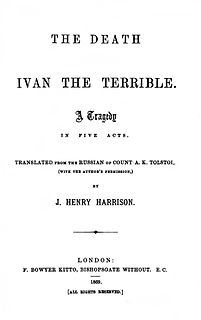
The Death of Ivan the Terrible is a historical drama by Aleksey Konstantinovich Tolstoy written in 1863 and first published in the January 1866 issue of Otechestvennye zapiski magazine. It is the first part of a trilogy that is followed by Tsar Fiodor Ioannovich and concludes with Tsar Boris. All three plays were banned by the censor. It dramatises the story of Ivan IV of Russia and is written in blank verse. Tolstoy was influenced by the work of William Shakespeare in writing the trilogy, which formed the core of his reputation as a writer in the Russia of his day and as a dramatist to this day.

Tsar Boris is a 1870 drama by Aleksey Konstantinovich Tolstoy, written in 1868-1869 and first published in the No.3, March 1870 issue of the Vestnik Evropy magazine. It became the third and the final part of Tolstoy’s acclaimed historical drama trilogy started by The Death of Ivan the Terrible (1864) and continued by Tsar Fyodor Ioannovich (1868).
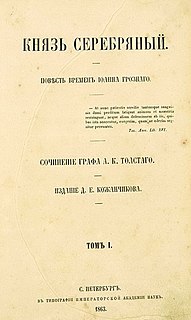
Prince Serebrenni is a historical novel by Aleksey Konstantinovich Tolstoy, written in 1859-1861 and first published in The Russian Messenger magazine in 1862 where it was divided into parts I and II. Translated by Princess Galitzine for Chapmann & Hall, it came out in English in 1874.


